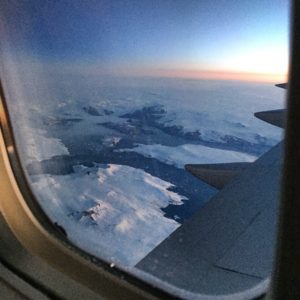Wanderlust-Inspired Compositions
One of the unexpected effects of moving to Paris has been my increasing sense of wanderlust, or the desire to travel and explore new places. A quick search on Pinterest or Instagram will reveal that I’m not alone – it’s human nature to dream of faraway places. Visiting other cities, countries, and continents expands our cultural appreciation and knowledge of the world. New environments force our brains to think differently than usual, often resulting in surges of creativity.
Wanderlust (whether fulfilled or not) has resulted in some magnificent pieces of classical music throughout history. Listen to these pieces and take a journey around the world without even leaving your home!
- Ralph Vaughan Williams – Symphony No. 7 (Sinfonia Antarctica) – Vaughan Williams never visited Antarctica, but was inspired by its ruggedness and extremities after composing the score to the film “Scott of the Antarctic”.
- Peter Maxwell Davies – Symphony No. 8 “Antarctic” – Unlike Vaughan Williams, Davies traveled to Antarctica at the age of 66 for three weeks (in December, no less!). His symphony was commissioned by the British Antarctic Survey to promote the region and also celebrate the 50th anniversary of Vaughan Williams’ Sinfonia Antarctica.
- Mendelssohn – Symphony No. 3 “Scottish” – Mendelssohn visited Scotland after his first visit to Britain in 1829. In a letter to his family, he told them that he was struck by inspiration for this symphony after visiting the Holyrood Chapel in Edinburgh.
- Mendelssohn – Hebrides Overture (Fingal’s Cave) – On the same trip to Scotland, Mendelssohn visited the isle of Staffa off the coast of the Hebrides, where he was inspired to write the Hebrides Overture (despite the intense seasickness he experienced).
- Albert Ketèlbey – In a Persian Market and In the Mystic Land of Egypt – Ketèlbey became Britain’s first millionaire composer, and for good reason. Although not considered a “serious” classical composer, he wrote scores for silent and talking films along with light orchestral pieces such as these.
- Rimsky-Korsakov – Scheherazade, Op. 35 – Arguably one of Rimsky-Korsakov’s most popular pieces, Scheherazade is based on “One Thousand and One Nights” and features Rimsky-Korsakov’s beautiful orchestration to depict Imperial Russia and orientalism.
- Jean-Sibelius – Finlandia, Op. 26 – Who better to write this musical account of Finnish history than Finland’s most famous composer? This tone poem was written as a protest against Russian censorship, and Sibelius later arranged this for solo piano.
- Zoltán Kodály – Dances of Galanta – Already famous among clarinetists for its extended clarinet cadenzas, this is a musical depiction of Galanta (which is now part of Slovakia). Kodály uses the verbunkos styles, which was a originally a military recruiting dance but later became a popular folk music style. According to the composer, Dances of Galanta is a sequel to his earlier composition, Marosszék Dances.
- Alexander Borodin – In the Steppes of Central Asia – Here’s Borodin’s description of this tone poem: “In the silence of the monotonous steppes of Central Asia is heard the unfamiliar sound of a peaceful Russian song. From the distance we hear the approach of horses and camels and the bizarre and melancholy notes of an oriental melody. A caravan approaches, escorted by Russian soldiers, and continues safely on its way through the immense desert. It disappears slowly. The notes of the Russian and Asiatic melodies join in a common harmony, which dies away as the caravan disappears in the distance.”
- Emmanuel Chabrier – España Rhapsody for Orchestra – Inspired by Chabrier’s trip to Spain in 1883, this piece was dedicated to French conductor Charles Lamoureux. Chabrier traveled to several cities in Spain, including Barcelona, Toledo, Granada, Valencia, and Barcelona, where he studied the regional music and dances.
- Manuel de Falla – “Ritual Fire Dance” from El amor brujo – This is the most popular piece from de Falla’s ballet El amor brujo, and it was partially inspired by Rimsky-Korsakov’s Flight of the Bumblebee. This is a musical depiction of a ritual fire dance, in which people jump through fire to celebrate the fire-gods.
What other compositions inspire wanderlust in you? Leave a comment below with your suggestions!
